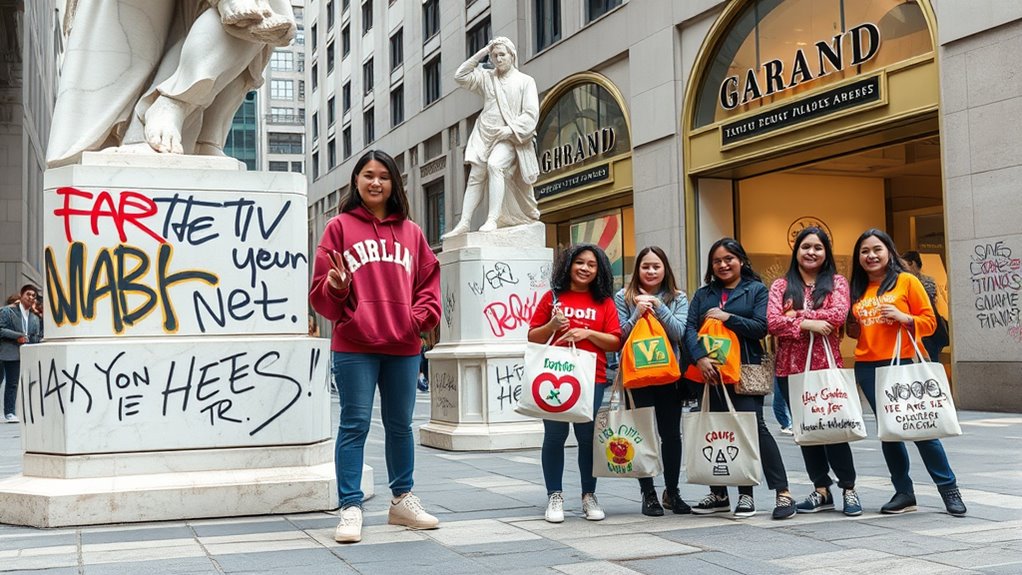Gen Z is reshaping luxury by challenging traditional clichés of exclusivity and status. They demand authenticity, sustainability, and social responsibility from brands, pushing them to be transparent and eco-friendly. As digital natives, they rely on social media, influencers, and authentic stories instead of high-profile endorsements. Their focus on experiences, values, and community means brands must adapt quickly or risk losing relevance. To learn how brands are responding, keep exploring these shifting tides.

As the youngest generation entering the luxury market, Gen Z may still hold a small share—around 4%—but their influence is growing rapidly. You might not realize it yet, but they’re already reshaping what luxury means. Unlike previous generations, Gen Z prioritizes authenticity, sustainability, and social responsibility over traditional symbols of status. They’re demanding brands drop old clichés rooted in exclusivity and extravagance and instead focus on meaningful storytelling and real-world impact. This shift challenges luxury brands to rethink how they engage with younger consumers who see luxury as more than just a product—they see it as a reflection of personal values.
Gen Z is redefining luxury through authenticity, sustainability, and meaningful storytelling rather than traditional symbols of status.
Gen Z’s emphasis on sustainability is one of their most powerful forces. About 64% are willing to pay more for eco-friendly luxury products, and they scrutinize brands for their environmental and ethical practices. They expect transparency and accountability, pushing brands to implement sustainable practices throughout the entire product lifecycle. Second-hand luxury shopping is also gaining mainstream appeal among them, highlighting their desire for circular consumption and reducing waste. Luxury brands, consequently, have no choice but to bolster their sustainability credentials if they want to stay relevant to these buyers who are deeply concerned about climate change and ethical consumption.
Their digital-native nature further fuels this push against old clichés. You probably know that Gen Z relies heavily on social media for discovery and purchase decisions. TikTok, ephemeral content, and influencers now shape luxury trends more than traditional advertising ever could. They prefer authentic, relatable creators over polished celebrity endorsements, which means brands must craft genuine, engaging stories that resonate emotionally. Video content and social sharing of luxury experiences are normalized habits, making luxury less about exclusivity in a closed circle and more about community, identity, and self-expression.
When it comes to shopping, Gen Z values the overall experience just as much as the product itself. They favor omnichannel retail, with 52% shopping online but 75% frequenting stores weekly for the experience. They tend to be less brand-loyal—57% less than before—and are highly trend-driven. Subscription services and flexible, secure payment options are essential, reflecting their cautious spending amid economic pressures. They want value—quality over quantity—and are increasingly discerning about where and how they spend.
Luxury brands face considerable challenges. The market shrank early this year, losing millions of customers, including many younger, aspirational buyers. To appeal to Gen Z, brands must shed outdated clichés of exclusivity and embrace personalization, community engagement, and authenticity. They’re competing not just on product but on storytelling, social impact, and digital relevance. If they don’t adapt, they risk becoming irrelevant to a generation that’s redefining luxury on its own terms. Moreover, as Gen Z seeks experiences that align with their values, they are increasingly drawn to brands that support eco-friendly initiatives, which can enhance brand loyalty and customer engagement.
Frequently Asked Questions
How Does Gen-Z Define Luxury Differently From Previous Generations?
You see luxury as something more personal and meaningful, not just status or exclusivity. Instead, you value authenticity, emotional connection, and brands that align with your values like sustainability and ethics. You’re willing to pay more for quality, purpose-driven items and prefer unique, vintage, or secondhand pieces. For you, luxury is about individual expression, meaningful experiences, and supporting brands that are transparent and responsible, rather than traditional symbols of wealth.
What Specific Old Clichés Are Gen-Z Challenging in Luxury Branding?
You challenge the clichés of luxury branding by rejecting the idea that it’s solely about exclusivity and status symbols. You push brands to move away from flashy logos and superficial displays of wealth, favoring authenticity and meaning instead. You demand transparency about sustainability and ethics, expecting brands to align with your values. Your digital engagement also calls for modern, relatable storytelling, pushing luxury to evolve beyond traditional, outdated notions of prestige.
How Are Luxury Brands Adapting Their Marketing to Appeal to Gen-Z?
You notice luxury brands shifting from traditional exclusivity to digital innovation, making shopping more personal and community-driven. They embrace immersive experiences like AR, NFTs, and virtual showcases, connecting with your culture and values. Through authentic storytelling, social media influence, and transparency about sustainability, brands humanize themselves. They respond quickly to ethical concerns, showing responsibility. This dynamic approach keeps you engaged, making luxury feel relevant, relatable, and aligned with your desire for authenticity and social consciousness.
What Role Does Social Media Play in Shaping Gen-Z’s Luxury Preferences?
Social media shapes your luxury preferences by making exclusive items more accessible and engaging. You discover new brands through authentic, behind-the-scenes content and influencer recommendations that resonate with your values. Social platforms also enable instant shopping, turning inspiration into purchases seamlessly. You value diversity, transparency, and sustainability in brand stories, and social commerce allows you to buy directly from feeds, influencing your luxury choices and making the experience more personal and immediate.
Are There Any Luxury Brands That Have Successfully Shifted Their Image for Gen-Z?
Did you know over 60% of Gen-Z values authenticity in brands? Many luxury brands like Louis Vuitton, Gucci, and Fendi have successfully shifted their images to appeal to younger consumers. They do this by blending heritage with digital innovation, using TikTok, NFTs, and immersive experiences. You can see how these brands embrace transparency, sustainability, and self-expression, making luxury more relatable and exciting for the new generation without losing their core identity.
Conclusion
You might think luxury brands won’t change because of tradition, but Gen-Z’s influence proves otherwise. By demanding authenticity and ditching clichés, you’re shaping a future where luxury feels genuine and inclusive. Your voice and choices push brands to innovate and evolve, making luxury more relatable and meaningful. So, don’t underestimate your power—your preferences are rewriting what luxury truly means, and that’s shaping a more honest, fresh industry you’ll want to be part of.









